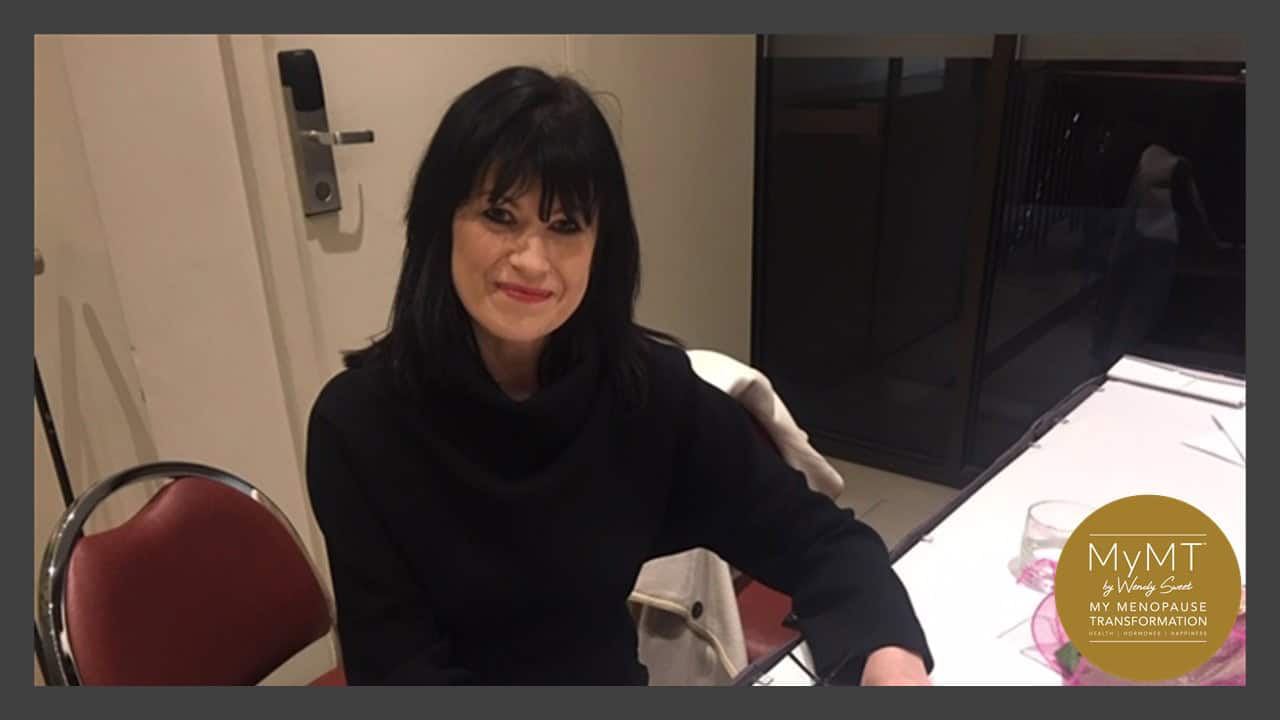When you manage a team of over 90 staff, life can be stressful – even more so, when you own the business.
Now, double that stress and its effect on you when you aren’t sleeping and waking up to night sweats. Every day becomes a battle. Anxiety levels increase as do hot flushes too. But there’s more – our heart rate starts racing, our blood pressure stays high and all day long we stay in this ‘stress cycle’ because our chronic stress hormone, called cortisol, stays elevated. High cortisol in the evening then prevents our sleep hormone called melatonin doing the job it’s designed to do, which is getting us ready to go to sleep. Keep going long enough on this cycle and you have a heart- health disaster waiting to happen.
This was Anna. She had no idea how her role as an owner and operator of a busy Swim School in Melbourne, impacted so much on her symptoms in menopause. Like me, she didn’t know about this life-stage and how as busy, active women with so much going on in our lives, hormonal changes in menopause clash with the way we learnt to live our lives.
This week I got to meet her when she organised me to come to Melbourne to present my ‘Masterclass on Menopause’. I was so excited and it was such a privilege to put a face to someone whom I had been coaching online through the My Menopause Transformation Circuit Breaker programme.
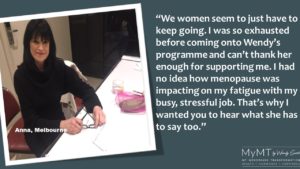
When we have a job as big as Anna’s with so much to manage and juggle, I feel it is such a shame that menopause is so often hidden from the conversation. And it shouldn’t be.
As I often say in my seminars, we are the first generation of women to go through menopause in the context of our careers, exercise and nutrition choices, parenting challenges, carer roles looking after elderly parents and more. All of these things accumulate to contribute to our stress levels. And when we go into menopause, our stress levels matter.
Stress is an interesting phenomenon.
I’ve studied it for decades but not in the context of menopause. But rather in the context of sport and exercise science and the accumulation of stress in the athlete. When athlete’s train and compete, their muscles, tendons, ligaments, gut and cardiovascular system undergo considerable ‘stress’. For athletes, this is a good thing. It’s the basis of performance adaptation. In other words, athlete’s need to over-stress the body in training to then allow it to make the right adaptations in recovery in order to become faster, fitter and stronger.
But when athletes don’t get their training and recovery cycles sorted (especially female athletes), then they begin to see a drop in performance. They don’t sleep, they accumulate additional inflammation leading to more injuries, the females often feel hot and bothered, motivation to train takes a dive, and many then begin to experience immune system health changes. Any one of you with teenage athletes in the house will know how hard it is to keep them healthy if they are doing large volumes of training and not sleeping. The technical term for this is ‘over-training’ and it is a well-researched distress phenomenon in athlete conditioning and optimal training adaptation.
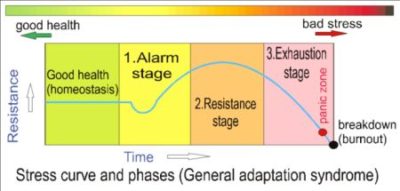
But here’s the thing. You don’t need to be an athlete for your body to go into ‘distress’. It happens to all of us and in menopause, stress matters.
When we aren’t sleeping, we aren’t recovering from all that we do in a day. If we aren’t recovering, we start to feel wired and tired and head towards the slippery slope, which in the corporate world, is simply called, ‘Burn-out’. I’m sure Anna used to feel like this too.
For decades women have had to thrive on stress – busy with home commitments, building their careers and busy being active with exercise as well.
In fact, you could say that it was our generation that invented this little ‘stress’ word as we wrapped it around our day-to-day lives.
But how is that working out for us now that we are in menopause? Have you ever wondered this? If not, then I want you to understand that the accumulation of stress affects every organ in our body and makes our menopause symptoms worse. For many of us, the accumulation of stress inside the body, leads to worsening menopause weight gain too.
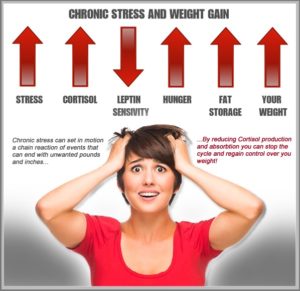
When I undertook my research on women’s healthy ageing and asked mid-life women what was their understanding of staying healthy, not one of them mentioned a good night’s sleep. They had all positioned ‘staying healthy’ in doing lots of exercise, especially higher intensity exercise. But the more I explored this, the more I realised that they also were not sleeping. And sleep is crucial to our health, whether we exercise or not.
The combination of not sleeping, being busy in our day to day working lives, caring for ageing parents and/or children and doing high intensity exercise leads to the accumulation of negative changes in the body that can make our symptoms worse – especially hot flushes, night sweats and feelings of anxiety. When we aren’t sleeping, we aren’t recovering from all that we do from day-to-day. Our body and brain goes into over-drive. In fact the body and brain goes into ‘Distress’.
There is not much escape from our stressful lives these days, so what we have to do is to discover how to manage it as we transition into and through menopause.
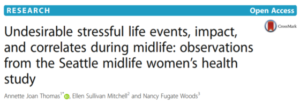
As we transition through menopause, the accumulation of all the various sources of stress can impact hugely on our symptoms.
From hot flushes, to night sweats, to insomnia to palpitations, anxiety and feeling bloated, we generally arrive at the Dr’s offices and then get placed on HRT (Hormone Replacement Therapy) or anti-depressants or other medications. Sure, these can help to alleviate the immediacy of the symptoms in many women and they are often a last resort for many caring Doctors to prescribe. But what if there was another way to manage our symptoms in menopause?
What if the first step to take was to better understand the powerful impact of the accumulation of the various sources of stress on our hormones and begin to alleviate these sources of stress or at least have some strategies to help us cope?

And I don’t just mean emotional stress. I’m also talking about the decades-long build-up of oxidative or physical stress that manifests as inflammation and metabolic chaos in our body. If your muscles are sore, if you have fibromyalgia, if your gut health has changed, if you have put on weight, and if you are feeling hot and bothered all the time, and you aren’t sleeping, then yes, these are all signs that your body is under-stress. If we don’t get on top of these changes during mid-life, then as I found too, your health may begin to suffer as well.
In both of the MyMT™ programmes (one for thinner women and one for overweight women) and in my live-seminars, I teach women about how our hormones all work together to help us survive in a busy, stressful world. This is what is often overlooked in menopause treatments. Our busy life isn’t being discussed and it should be.
There is a powerful connection between our pituitary gland which produces our sleep and reproductive hormones, our thyroid gland which regulates our metabolism, temperature and blood pressure and our adrenal glands, which moderate our stress hormones. These glands all produce hormones which have powerful effects on our body.
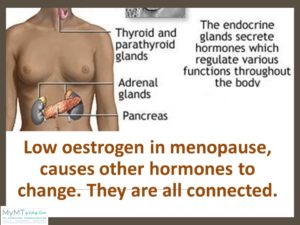
As part of my women’s healthy ageing studies I was absorbed in women’s health research. That’s when I discovered the Seattle Midlife Women’s Health Study* and learnt how our various sources of stress impact on our symptoms in menopause. [Refer image below from the Study, p. 4]
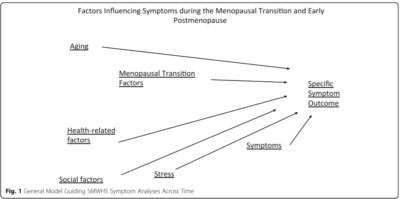
This study made me sit up and take stock of the stress in my life. It also enabled me to put together the stress-hot-flush-sleep connection for us in menopause.
Spanning 23 years, this study reported on thousands of women between the ages of 45-60 years who had shared aspects of their daily lives and health changes during this time with researchers. One area of investigation was the meanings they attached to midlife. Participants described experiencing a diverse array of stressful events from their changing health in menopause to family problems, work-related issues, deaths, frustrated goal attainment and financial concerns. All areas that I’m sure many of us might relate to as well.
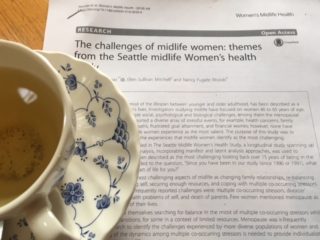
But herein lies the problem – whilst all of these very real sources of psychological stress were reported by women in this study, what’s missing are all the other sources of stress that women in their menopause transition now experience too. The research doesn’t take consideration of the various sources of physical stress inside our body as we reach our menopause years.
This is known as oxidative stress or cellular inflammation and invariably, for women in their late 40’s and mid-to -late 50’s who are in menopause, oxidative stress has been building up for years. Lifestyle research is now showing that hormonal changes during menopause then become the catalyst for worsening inflammation that sits around our body. This inflammation has arrived in our cells and tissues from a lifetime of changing nutrition, excess or low-levels of exercise, liver toxins, alcohol, smoking, exposure to chemicals and more. [Egger & Dixon, 2009)
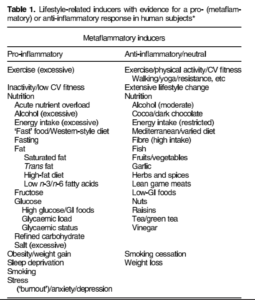
Put this together against emotional stress and not sleeping during menopause and so begins a cocktail of health problems as our body goes into ‘distress’. For many women, this manifests as worsening hot flushes, sore joints, depression, mood swings, restless legs and feelings of not coping.
This is why, managing or reducing ALL of the sources of stress in your life (physical and emotional), helps to reduce your menopause symptoms and it’s what I focused Anna and all the women on when they come into the online MyMT programmes.

When we examine all the various sources of stress, both emotional and physical, we can see how these accumulate over time. The term for this is one may not have heard of – ALLOSTATIC LOAD.
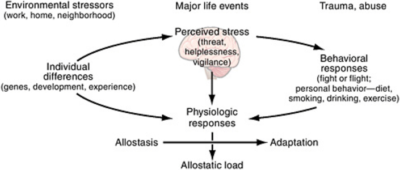
I remembered this term from teaching university-level physiology to sport and exercise students. Allostatic load describes the accumulation of stress over time that affects our health and can lead to pre-clinical signs of disease. If we don’t get our sleep and other symptoms sorted in menopause, then as many of us have already felt already, or we have seen with our mother’s generation, menopause can be the gateway to more health problems as we age.
Managing our Sources of Stress:
When Anna began to examine the factors that were impacting on her stress levels, lack of sleep was at the top of her list. Managing her Swim Centre was a job that she was familiar with and was highly capable at. But what she was struggling with was the lack of energy and motivation to do her job effectively. Hence, sleeping all night again was imperative.
I was so pleased when she came onto the Circuit Breaker programme, because she learnt to re-establish her sleep routine and reduce her hot flushes. Like all the women who join the programme, Anna learnt how to do this by re-establishing her circadian rhythm. This is our powerful day/ night cycle and when we are busy and stressed, it gets out of sync. When it does, this has a roll-down effect on our thyroid, adrenal and pancreatic hormones too. So restoring and re-balancing your sleep hormone called melatonin is important. If we don’t do this, then our entire body gets out of balance. It’s why, how to re-establish sleep is the first of my 7 modules women listen to on the MyMT™ programmes.
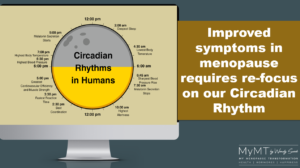
The other thing Anna had to do was to put in place nutritional changes that allowed her to maintain her energy levels throughout her busy day. There is so much confusion about food choices these days, but for busy women not sleeping, they must follow a diet that gives them the energy they need. This means eating foods that don’t spike blood sugar levels and provide lots of healthy nutrients that our body needs as we age. I have all the food information that women need in the programmes as well as a focus on nutrient timing, which is important for sustaining our energy levels during the day in order to be more effective in our jobs.

Stress management in menopause is crucial to the reduction of all of your symptoms. I can’t reinforce this enough. Sometimes it is difficult to understand what to do though, and this is what I help you achieve in my 12 week programmes. There isn’t even a lot of exercise in these programmes because when you aren’t sleeping, you don’t have the energy for exercise. Sleeping all night comes first before lots of exercise.
When you come on board with me and let me share your menopause journey with you, you’ll learn how to manage yourself during menopause. If you have a stressful job, as Anna does, then I hope you can join me in either of my programmes – Circuit-Breaker is for thinner, leaner women (it’s ON SALE this Month – please use the promo code RESTART 2019) and Transform Me is for you, if you are overweight. It would be my privilege to be your guide throughout my powerful online programmes which you do in your own time at your own pace, with my online coaching support when you need it as well.
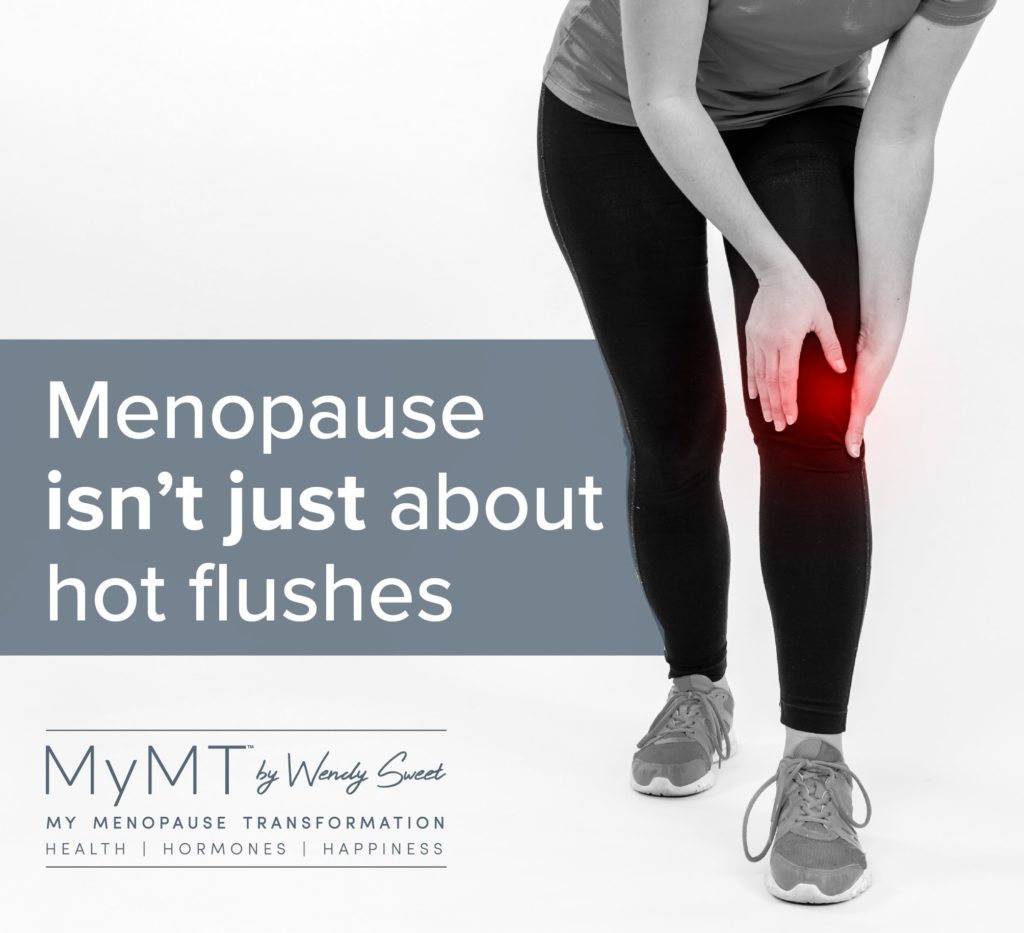
Dr Wendy Sweet [PhD/ Women’s Healthy Ageing Researcher and MyMT Founder & Coach]
References:
Egger, G. & Dixon, J. (2009). Obesity and chronic disease: always offender or often just accomplice? British J. of Nutrition, 102, 1238 – 1242.
Woods, N. & Mitchell, E. (2016). The Seattle Midlife Women’s Health Study: a longitudinal prospective study of women during the menopausal transition and early postmenopause. Women’s Midlife Health, 2(6), 1-16.
